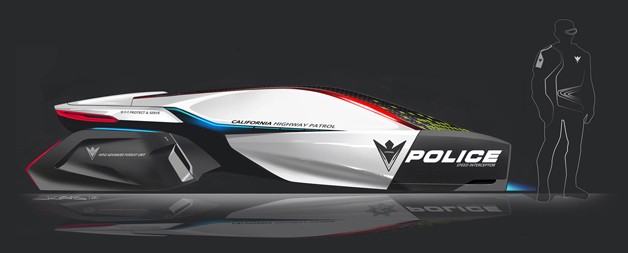


Every year, the Design Challenge–formulated by and for the LA Auto Show–asks the automotive industry’s most advanced design labs to speculate on possible futures as they pertain to the continuing evolution of the automobile. This year’s theme: highway patrol 2025. Entries from the likes of GM, Subaru, BMW, and Honda naturally show a lot of imagination, but more than that they show a degree of agreement between the industry’s brightest creatives that the future is going to be crowded, full of traffic jams, and above all very, very automated.
Everyday police work in 2025 will be autonomous and remotely controlled.
As in the defense sector, robotics potentially offer law enforcement agencies a force multiplier–something that allows fewer officers to be more productive at a lower cost–and this year’s Design Challenge entrants clearly understand that. Some of the proposals are pretty straightforward; Mercedes Benz offers up an advanced, fuel-efficient SUV for police forces trying to own the road with sheer size, while General Motors introduces the “Volt Squad,” a three-vehicle manned system based on the electric propulsion technology pioneered for the Chevy Volt.
But the proposals put forth by Honda and BMW perhaps speak to the most likely future of routine traffic patrolling. Honda Advanced Design’s CHP Drone Squad is an optionally manned system that makes highway patrol work more like the routine intelligence-gathering conducted by the U.S. military. That is to say, everyday police work in 2025 will be increasingly autonomous as well as remotely controlled. Honda’s Drone squad is composed of a larger optionally manned Auto-Drone that functions like a mobile forward operating base capable of deploying smaller unmanned two-wheeled motorcycles called Moto-Drones. Both cruiser and its deployed robots can work together to chase down and corral offenders or participate in various interception, intercession, or other first-response missions, like a technology-heavy police cruiser with its own small fleet of helper robots.
BMW’s concept is similar. Created by BMW Group DesignworksUSA, E-Patrol is the manned police cruiser of the future. The team’s research predicted that Los Angeles 2025 will host a traffic-filled yet fast-moving transit atmosphere, and for the car chases of the future the officers driving E-Patrol will be able to deploy both aerial drones or single-wheeled unmanned ground vehicles to pursue other vehicles or gather information and report back to the hub. Essentially, a couple of officers on patrol could do the work of multiple cruisers and an aerial helicopter unit today–assuming someone pioneers a user interface that would allow said officers to manage the entire system simultaneously.
That last part might be the biggest design challenge of all, and it will require lots of robotic autonomy. But if the concepts put forth by the auto industry’s most forward-thinking creatives is any indication, highway policing by autopilot could become the norm. And while this future won’t necessarily come to pass in the next 15 years, there’s a strong chance that at some point we will find ourselves receiving moving violations from autonomous systems, from some kind of RoboCop (minus the cyborg element). So don’t bother crying–your pitiful human emotions won’t get you off the hook this time.
